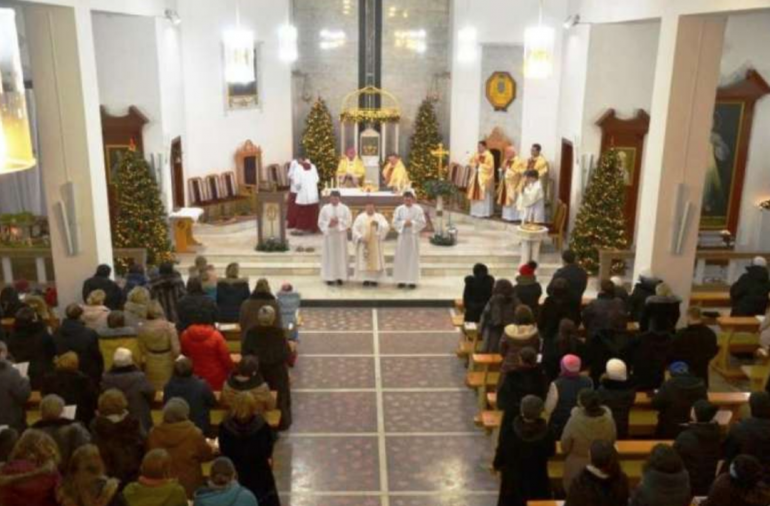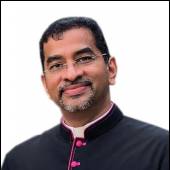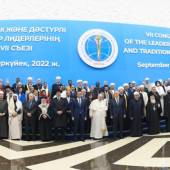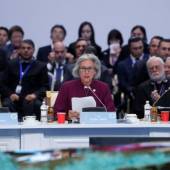Pope's document inspires unique mission for Central Asia

The Catholic Church in Central Asia has unique opportunities to engage in new forms of mission by identifying new opportunities suitable for their context, taking inspiration from Pope Francis' apostolic exhortation Evangelii Gaudium, say church leaders.
"The Church in Central Asia is experiencing a special situation which, perhaps precisely because of its uniqueness, can encourage new forms of mission,” Archbishop Giampietro Dal Toso, president of the Pontifical Mission Societies (PMS), said during a recent webinar that brought together church leaders from the region.
The virtual event titled "The mission of evangelization in Central Asia in times of the Evangelii Gaudium: Context, difficulties, perspectives" was organized by the PMS on Oct. 12-13 as part of promotional activities for mission awareness and formation for the Church in Central Asia, reported the Vatican’s Fides news agency.
In Evangelii Gaudium (The Joy of Gospel), the pope spoke about new forms of missionary activities.
“The pope, in Evangelii Gaudium, spoke of 'missionary creativity': a digital meeting like this, which brings together the members of the Central Asian Church, can represent a useful tool to identify new forms of mission suitable for such a specific context," Archbishop Dal Toso said.
The webinar was the latest in a series of recent developments in the region starting with the Vatican’s establishing of a new regional bishops’ conference that brings together Catholic bishops from Kazakhstan, Uzbekistan, Kyrgyzstan, Turkmenistan and Tajikistan.
Aspects and experiences of the missions in the Central Asian region were examined in the webinar. Participants spoke about the specific situations and challenges of the Church and issues common to the five countries and neighboring Mongolia and Afghanistan.
Italian Bishop Adelio Dell'Oro of Karaganda in Kazakhstan pointed out that Catholics are a “small flock” as they are a minority in Islamic-majority countries with enormous linguistic varieties where opportunities exist to spread the message of the Gospel in ancient and rooted local cultures and traditions.
"We need to understand if we have a clear direction for the development of the Church or if we are confused and continue the same motionless pastoral care as always. When the locals come to ask us how to walk, they need to be guided through a clear route, or they will be disappointed,” he said.
Bishop Dell'Oro said that Evangelii Gaudium is a great instrument which traces “a direction for the new evangelization by indicating joy as a way of witnessing" by entering the history and local culture and avoiding individual and sentimental devotions.
Archbishop Dal Toso encouraged church leaders to bring the Gospel to cultures without imposing anything.
"Bringing the Gospel into cultures other than ours does not mean simply learning languages or finding words and images to make oneself understood, but it also means committing oneself so that the culture that receives Christianity can slowly welcome it and change it,” he said.
Islam dominates in the five Central Asian nations that gained independence after the fall of the Soviet Union. Most of the region’s estimated 72 million population are Sunni Muslims and there is a significant concentration of Russian Orthodox Christians. Catholics are a tiny minority in the region.
Kazakhstan is the largest of the five nations with nearly 15 million inhabitants. Catholics are estimated to number 250,000 spread in 70 parishes. There are five parishes in Uzbekistan, three in Kyrgyzstan and two in Tajikistan, while in Turkmenistan about 250 Catholics gather in the chapel of the Transfiguration of the Lord in the capital Ashgabat.
Radio Veritas Asia (RVA), a media platform of the Catholic Church, aims to share Christ. RVA started in 1969 as a continental Catholic radio station to serve Asian countries in their respective local language, thus earning the tag “the Voice of Asian Christianity.” Responding to the emerging context, RVA embraced media platforms to connect with the global Asian audience via its 21 language websites and various social media platforms.














